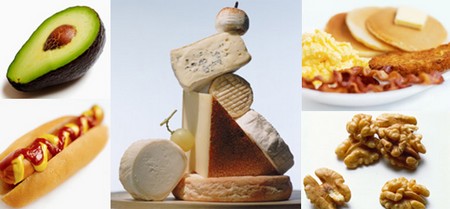Many people, when they do address their diet and begin to eat more healthily, lump all fats together as health villains that will make them overweight, with the result that they cut down on the fats that are actually good for them. The Western world has become almost allergic to the concept of fat in the last two decades. Every other product you see in the supermarket today is ‘low fat’, from ready meals to dairy products, spreads, crisps and biscuits. This is because obesity has now become a serious problem, burgeoning in the same way as depression in the last decade. Although there is not thought to be any link between obesity and depression, diet plays a strong contributory factor in both conditions.
But it is not the healthy fats that are causing the problem. It is the saturated fats, including low-fat products, which are most often hydrogenated, saturated or trans fats, and we are not doing ourselves any favours in the battle with our weight by eating them instead of the nutritious oils which are full of essential fatty acids, such as olive, walnut, rape and sesame.

What are the unhealthy fats?
Saturated fat, as we mentioned earlier, makes the cell membranes in our brain and body tissue less mobile, and therefore reduces efficiency in all our body systems, making depression more likely and also increasing the risk of heart disease. Saturated fat mostly comes from animal sources. You can recognise it because it is generally hard at room temperature, like butter, cheese, lard. But full-cream milk and cream also have a high saturated fat content, and so do some oils such as coconut and palm oil.
Trans fat, which is fat that has been refined and hydrogenated, or hardened, turns healthy unsaturated vegetable oils into unhealthy saturated fat and should be avoided as much as possible in your diet. It can actually lead to a deficiency in essential fatty acids by tying up the metabolic processes like a broken key in a lock and preventing EFAs from progressing along the metabolic pathway from the parent omega-3 and omega-6 and being converted into the vital EPA, GLA, DHA and AA. Experts believe these trans fats are one of the biggest causes of EFA deficiency and the resultant health problems it causes. They are found in many commercially made cakes, biscuits, crisps, processed meat and ready meals. There is no law to insist that manufacturers of processed food list the trans fat content yet, but if you avoid processed food wherever possible, you will also avoid the damaging trans fat.
And the healthy fats?
These are the unsaturated fats which should make up the largest proportion of fat in your diet.They are either monoun-saturated or polyunsaturated, depending on the number of hydrogen atoms attached to their carbon-atom backbone. Most vegetable oils are a combination of the two, but predominantly one type.
- Monounsaturated fats include olive, almond, peanut, hazelnut, avocado and rapeseed.
- Polyunsaturated fats include sunflower, walnut, soya bean, pumpkin, corn and sesame. All essential fatty acids are polyunsaturated fats. These are the healthiest fats to eat, but unfortunately the polyunsaturated oils we buy in the supermarket are not always what they seem.
Pure, unsaturated, unrefined oils are health-giving, and are more easily metabolised than their saturated fat counterparts, not to mention their benefits to brain function. Taken in moderation, good quality oil is beneficial and will help in your fight against depression. When buying oil, try to buy cold-pressed, extra virgin oils, as these are less refined and have retained the most nutrients.